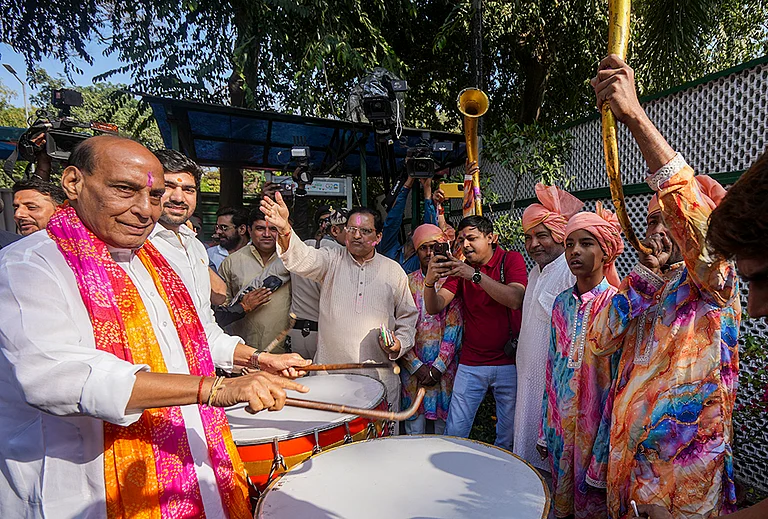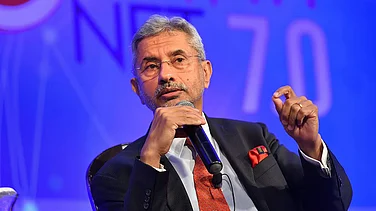Nearly a fortnight since the unnatural death of a first-year Bengali department Jadavpur University student, new details from the fateful night of August 9 have once again put the spotlight on the culture of toxic masculinity and institutionalized violence that permeates through higher educational institutions in India. 17-year-old student from Nadia district in West Bengal jumped or fell to his death from the fourth-floor window inside his hostel after allegedly being harassed by his “seniors” who had been "illegally" living inside the hostel despite passing out. In the course of the ritualistic ragging, the young boy was taunted ovechir his sexuality, disrobed, and forced to run naked from room to room to flee his tormenters, as per reports.
The incident has quite rightly shocked the Bengali “bhadralok” who has wasted no time in vilifying the university campus as a lawless dystopia that harbours lazy no-gooders wasting their good years on useless politics or indulging in libidinal excesses and illicit addictions, cigarette, and alcohol being the least objectionable of them. News channels have descended on the campus like piranhas on a feeding frenzy, cloying out unsuspecting students and tearing them to pieces with their skilfully crafted interrogations. A video clip of a young student’s “interview” to a purported “news channel” run by YouTubers in which she says that the campus is a place where she can smoke and drink freely has blown out of proportion and suddenly the whole world is questioning “toxic JU Culture” and the purportedly Dionysian privileges that students enjoy on campus.
But beyond the shrill voices of TV news anchors, the incident has led to a debate and discussion - especially among students and alumni - regarding the politics of ragging in higher education institutions and how liberal intelligentsia, otherwise glorified for its interest in rights-based work, is often complicit in the oppression of marginalised students.
“The top-down patriarchal set-up is nothing new in any academic institution in India. The thing with colleges having a large divide between the seniors and juniors is probably what facilitates it,” states Soumyadip Roy, artist and former student of JU.
Roy contends that there's an unsaid hierarchy between a first-year student and a third-year student, even though they might only be a couple of years apart. "The gap in real life is huge". A student of fine arts, Soumyadip adds that in Art colleges, for instance, seniors sometimes restrict juniors from working on certain styles which they might deem not relevant.
“Then these juniors become seniors the following year and become perpetrators. It's like an unending cycle until eventually, they become professors at the same college and carry on this brainless tradition. It's nauseating. It was one of the reasons why I never wanted to get into an art college for a formal degree,” Soumyadip adds.
Backing the assertion, Professor Kalyan Kumar Das of Presidency University, who is also a former student of JU, recites an anecdote about the author Rudyard Kipling who went from India to Eton to study, only to be bullied by his peers, and returned to India where he went on to bully Indians. “It speaks of the psycho-pathological aspect of ragging culture in which the victim starts identifying with the aggressor that needs to be addressed,” Das states. Incidentally, the perpetrators of Kundu's harassment were also residents of rural or semi-urban districts.
But what leads to such attitudes?
Das argues that such behaviour may stem from the culture shock and subsequent cultural alienation that students who come from disadvantaged or marginalised backgrounds, or from culturally different backgrounds like rural or semi-urban towns, face and the subsequent social "othering" practiced by the dominant urban majority of cities.
“I think a lot of students coming from the small towns and rural areas find it difficult to get assimilated within a more assertive, more visible section of the student community in elite institutions like JU or Presidency,” Das explains. Additionally, how they are themselves perceived by the assertive and urban section - generally based on the way they speak or dress, their proficiency in English, and other socio-economic class indicators - adds to their alienation and the cultural divide between the two sections. In some cases, these students who remain “outsiders” start having an ambivalent relationship with this more culturally elite, socially assertive urban milieu who also happen to be their classmates otherwise.
In time, such ambivalence can lead to shaky perceptions of idealised class aspirations, meaning that some may choose violent or unethical ways to achieve upward class mobility. Such mentalities are a precursor to sexual tensions and violence and it is not uncommon to find a lot of “incel” men among these repressed crowds of students, especially the “seniors”.
But Das insists that when we speak of ragging or bullying, we need to consider not just incidents of “ragging” but internalised power structures.
Jadavpur University’s Rimi B Chatterjee, who teaches at the English department states that calling instances like the recent one ragging “trivialises the matter. It is a systematic recruitment process wherein these children are essentially inducted into power structures. And by the time we realise what is happening, it is too late for them to get out”.
Chatterjee points out that the Covid-19 pandemic has had an adverse effect on the vibrancy of campus life. “The pandemic has left the student life and the social fabric of JU fractured. Having spent the past few years in isolation or remote learning mode, many students on campus today are not yet fully adept at dealing with real campus life and its many shades and there is no solidarity or trust among students".
The pandemic has also made it a cut-throat environment for student wings of political parties that have left no stone unturned to raise their numbers by embarking on "highly aggressive recruitment drives without caring for student welfare,” Chatterjee states.
Anyone privy to student life in Jadavpur can attest to the “Dada culture” that exists on campus, wherein student politics leaders achieve cult status among juniors which they often abuse by exploiting the lack of political and socio-spatial understanding of freshers.
“This is why it is imperative to protect first-year students joining such urban universities, especially those from outside or from marginalised backgrounds,” she states.
She adds that it is imperative to protect freshers from persons “entrenched in the power hierarchy” until the students have had time to “find their feet” in the institution and make decisions based on their own insights and views rather than on the basis of persuasive “seniors”.
Incidentally, the incident where the death of Kundu took place, the infamous “Main Hostel” is located about a kilometre away from the main college campus, making it harder for faculty members like Chatterjee to supervise or administer. The hostels are governed by their own administrative bodies and in this case, Chatterjee alleges that the administrative body was complicit in the neglect that led to Kundu’s death. “There is an administrative structure which is supposed to oversee the hostel that was essentially shielding the perpetrators,” she states.
In the past, some like Souvik Bhattacharya from IIT Kharagpur who was the VC in JU for a short spell tried to regularise the hostel situation but he was stopped by student agitation. “Essentially, this situation is a legacy of our founding (we were set up by the National Council of Education). At that time the hostel was outside campus for reasons that I am not aware of because it happened in the 50s. But since then, nobody has tried to change it, a fact that has actually been exploited by certain groups to their own nefarious ends,” Chatterjee states.
Call to reflect?
Whether it is on campus or off it, discrimination and social othering have always been a part of campus life and perhaps it is simplistic to assume that institutes that provide active spaces for dissent, political debate and discourse, or for (relatively unfettered) freedom of speech and lifestyle, are truly equal or inclusive. While extreme incidents like the death of the first-year student send authorities in a tizzy to bring in policing reforms, the inherent socialisation processes entrenched within people based on class, caste, creed, gender, regionalism, and linguistics, are barely or rarely addressed.
A student from a Bengali medium school who grew up in a mofussil town and went on to spend the years between 2003 and 2016 as a student of the JU English department says on condition of anonymity that humiliation is often a part of the process of growing up.
"I was subjected to teasing and ragging when I joined as an undergrad. This was, however, quite mild in comparison to what happened with Swapandeep,” he states.
Being one of the few “Bengali-medium” students in class and the only one from a Bengali-medium school from outside Kolkata, the former student often felt left out of all the passing conversations, jokes and references. “Before joining JU, I had read 7 English books: the five Harry Potter novels that had come out till 2003, Treasure Island, and War of the Worlds”.
His experience speaks of the imaginary threshold that many students like him struggle to cross. An institute whose students unfailingly boast of its revolutionary past, on its meticulously guarded freedom of speech and expression and spaces for political and creative expression, can also become the perpetrator of institutionalised violence.
The incident has prompted many of those associated with JU, including former students, to turn the lens inward and look at not only the failings of the institution but also the failures of the student community.
Samrat Sengupta, a former student of Jadavpur and now an Associate Professor of English at Sidho Kanho Birsha University, writes on Facebook that the incident reveals the “elite intellectual myopia” of many of the students and faculty, especially those who come from the privilege of being English educated or even just as residents of Kolkata. “I can say loudly that the Jadavpur of ragging and gay hatred is not my Jadavpur. It's not just a university to celebrate the success. Sadly, this sensitivity has not reached all over the university,” he writes.
The incident has led to calls for self introspection and perhaps a wider analysis of the annals of liberal arts academia which often suffers due to hypocritical self-congratulations. There is also a call for electing better student bodies and representatives.
Can CCTV end 'Monoculturalism'?
So what is the solution? CCTV installations? ID checks? Perhaps. But many faculty members, students and alumni feel that ragging discrimination or abuse is not discipline-centric or institution-centric and there is a need to view it as a larger socio-pathology that many of us suffer from. It is also not something that is likely to magically disappear in the presence of CCTV cameras. What about bathrooms and bedrooms where a large part of communitarian socialisation (and abuse) takes place?
Sengupta states that a campus like JU, despite its progressive outlook, lacks the mechanism for integrating students from economically and culturally marginalized, non-urban students. "The urban bhadrolok monoculturalism is responsible for this. Both teachers and students are responsible for this difference which caused ragging to be continued in a hostel while we were fighting for our liberal views," the former student states.
He feels that there is a need to foster a multicultural spirit, a better class and caste consciousness within campus by reaching out to economically and culturally marginalized students with others and getting into a dialogue with them can solve the problem. "JU is not a homogenous space and I think it's wrong to demonize it the way some media houses are doing. The problem is it's many spaces often don't speak to each other. Otherwise how can a gender sensitised campus like JU can have such an incident where a boy is asked to prove that he is not a homosexual?" Sengupta asks.
Creating inclusive educational infrastructures, however, needs funds and financial support from state and central governments.
Every financial year, a large share of our GDP goes toward improving our military power and clout. Educators like Das and Chatterjee wonder why the nation can’t invest more of the GDP into sectors like health and education. After all, it is the responsibility of state and central governments to provide resources to institutions of research and higher learning. How can funding save the lives of students and stop ragging?
Das suggests that more money can perhaps be used to appoint professionals who can help students understand systemic casteism or gender or deal with mental health issues. Ad-hoc mental health professionals on campuses, for instance, could prove to be a better response to addressing a complex question like ragging and bullying than installing CCTVs.






















